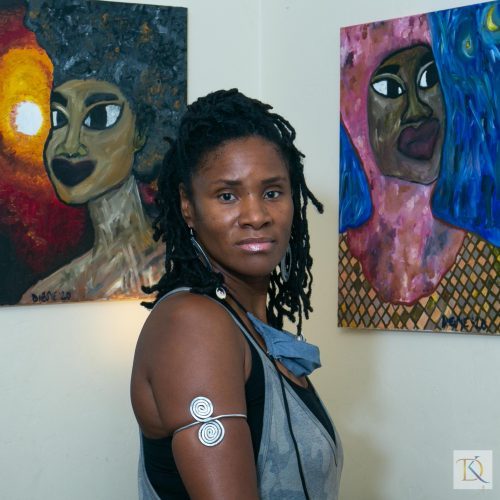
Randiesia Fletcher
When a Venice, California Elementary school teacher asked Randiesia Fletcher what she wanted to be when she got older, her reply was, “…an Artist.” And, more than three decades later, she is still fulfilling that goal, in more ways than one.
Tucson Public Voices Fellow, Randiesia Fletcher is an Artist, Author, and Educator, but on the streets, she’s heralded as an “urban missionary.” Her passion is fueled by helping the under-served populations society often ignores.
Randiesia grew up in L.A.’s Skid Row slums—reared by drug-addicted parents. Her childhood was plagued with abuse, neglect, and homelessness, so as a teen, she enlisted into the USMC. It proved to have its own challenges of racism and sexism and was subsequently retired as a Disabled Veteran.
Not defeated, Fletcher completed a Bachelors of Arts in Creative Writing/ Anthropology—University of Arizona, and a Master’s of Arts in Education—University of Phoenix. She completed research abroad in Women’s Occupations in the Republic of Fiji. To highlight her struggles, she published Scratches, Needles, and the Glass Pipe: Coping with Rejection, Hurt, and Abandonment and Social Mindfulness: Child Soldiers. She founded I Can Do All Things, Inc., a nonprofit organization, to help alleviate generational poverty through teaching Sustainability Education, and she co-created the Refugee Resource Center, to advocate for refugees, asylees, and others victimized by poverty and sexual assault.
Currently, she and her husband run the Urban Forest Project (UFP) by Harris-Fletcher Enterprises. The mission of Harris-Fletcher Enterprises (HF Enterprises) is to deliver economic solutions through sustainability education. The purpose of the UFP is to provide sustainable low-income housing, reduce energy consumption by 50%, and to provide green spaces replete with edible trees that help mitigate the Tucson Heat Island Effect.
Randiesia is an Expressionist Artist and maintains a mobile museum and popup library. She challenges the perceptions of Pan-African faces; particularly a non-smiling face. Her goal is to redefine these faces that have been subjected to stereotypical thugs, criminals, harlots, Jezebels, and exotic sapphires. The collection eases the fears of normal facial expressions—the expressions of culture, family, community, and nationality; a message in line with the ideals of Contemporary Art in the 21st Century.
Randiesia’s artistic works are influenced through the literary works of W. E.B. Dubois, Claude McKay, Zora Neale Hurston and more. Dubois speaks about the Double Consciousness—how people are forced to view themselves and the world through a lens of racism. It is the dichotomy of how a person views themselves, versus how the world views that person.The wife and mother of three currently lives in Tucson, Arizona, and continues to write her own story
Additionally, Randiesia practices and teaches mindfulness and meditation, “Our place and how we breathe, interact and inter-react with others most definitely colors the realities of who I am as a Black woman and how others see me.” The wife and mother of three currently lives in Tucson, Arizona, and continues to write her own story.
Randesia appears in this video made by The Drawing Studio on Celebrating Women in the Arts
